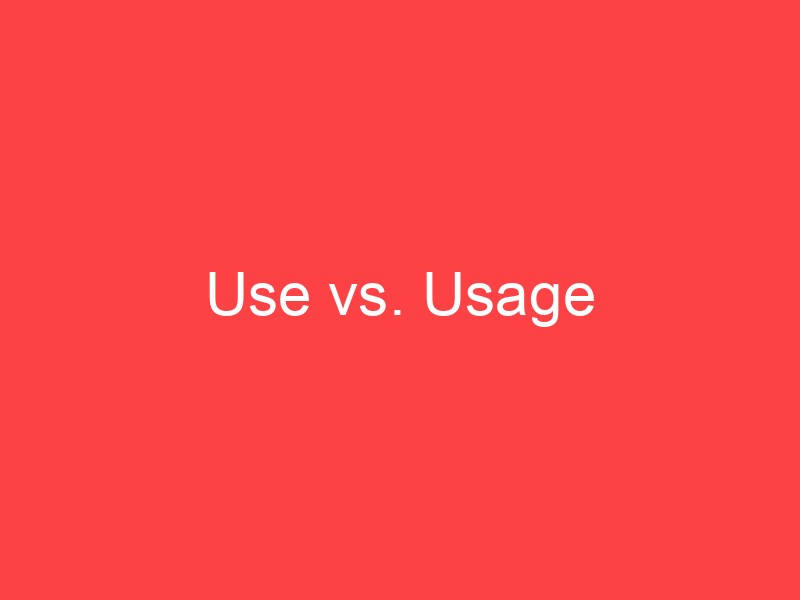-
Use (noun)
The act of using.
“the use of torture has been condemned by the United Nations;”
“there is no use for your invention”
-
Use (noun)
Usefulness, benefit.
“What’s the use of a law that nobody follows?”
-
Use (noun)
A function; a purpose for which something may be employed.
“This tool has many uses.”
-
Use (noun)
Occasion or need to employ; necessity.
“I have no further use for these textbooks.”
-
Use (noun)
Interest for lent money; premium paid for the use of something; usury.
-
Use (noun)
Continued or repeated practice; usage; habit.
-
Use (noun)
Common occurrence; ordinary experience.
-
Use (noun)
The special form of ritual adopted for use in any diocese.
“the Sarum, or Canterbury, use; the Hereford use; the York use; the Roman use; etc.”
-
Use (noun)
A slab of iron welded to the side of a forging, such as a shaft, near the end, and afterward drawn down, by hammering, so as to lengthen the forging.
-
Use (verb)
To utilize or employ.
-
Use (verb)
To employ; to apply; to utilize.
“Use this knife to slice the bread.”
“We can use this mathematical formula to solve the problem.”
-
Use (verb)
To expend; to consume by employing.
“I used the money they allotted me.”
“We should use up most of the fuel.”
“She used all the time allotted to complete the test.”
-
Use (verb)
To exploit.
“You never cared about me; you just used me!”
-
Use (verb)
To consume (alcohol, drugs, etc), especially regularly.
“He uses cocaine. I have never used drugs.”
-
Use (verb)
To consume a previously specified substance, especially a drug to which one is addicted.
“Richard began experimenting with cocaine last year; now he uses almost every day.”
-
Use (verb)
To accustom; to habituate. Now common only in participial form. Note: This usage uses the nounal pronunciation of the word rather than the typically verbal one.
“soldiers who are used to hardships and danger}} {{q|still common”
“to use the soldiers to hardships and danger}} {{q|now rare”
-
Use (verb)
To benefit from; to be able to employ or stand.
“I could use a drink. My car could use a new coat of paint.”
-
Use (verb)
To habitually do; to be wont to do.
-
Use (verb)
To habitually employ; to be wont to employ.
-
Use (verb)
To habitually do. See used to.
“I used to get things done.”
-
Use (verb)
To behave toward; to act with regard to; to treat.
“to use an animal cruelly”
-
Use (verb)
To behave, act, comport oneself.
-
Usage (noun)
The manner or the amount of using; use.
-
Usage (noun)
Habit or accepted practice.
-
Usage (noun)
The ways and contexts in which spoken and written words are used, determined by a lexicographer’s intuition or from corpus analysis.
-
Usage (noun)
Correct or proper use of language, proclaimed by some authority.
-
Usage (noun)
The treatment of someone or something.
-
Use (verb)
take, hold, or deploy (something) as a means of accomplishing or achieving something; employ
“she used her key to open the front door”
“the poem uses simple language”
-
Use (verb)
treat (someone) in a particular way
“use your troops well and they will not let you down”
-
Use (verb)
exploit (a person or situation) for one’s own advantage
“I couldn’t help feeling that she was using me”
-
Use (verb)
apply (a name or title) to oneself
“she still used her maiden name professionally”
-
Use (verb)
take (an illegal drug)
“they were using heroin daily”
“had she been using again?”
-
Use (verb)
take or consume (an amount) from a limited supply
“we have used all the available funds”
-
Use (verb)
describing an action or situation that was done repeatedly or existed for a period in the past
“this road used to be a dirt track”
“I used to give him lifts home”
-
Use (verb)
be or become familiar with (someone or something) through experience
“she was used to getting what she wanted”
“he’s weird, but you just have to get used to him”
-
Use (verb)
one would like or benefit from
“I could use another cup of coffee”
-
Use (noun)
the action of using something or the state of being used for a purpose
“hyper-modern trains are now in use”
“the software is ideal for use in schools”
“theatre owners were charging too much for the use of their venues”
-
Use (noun)
the ability or power to exercise or manipulate one’s mind or body
“the horse lost the use of his hind legs”
-
Use (noun)
a purpose for or way in which something can be used
“the herb has various culinary uses”
-
Use (noun)
the value or advantage of something
“it was no use trying to persuade her”
“what’s the use of crying?”
-
Use (noun)
the benefit or profit of lands, especially lands that are in the possession of another who holds them solely for the beneficiary.
-
Use (noun)
the habitual consumption of a drug
“burgling and dealing financed their heroin use”
-
Use (noun)
the characteristic ritual and liturgy of a Christian Church or diocese.
-
Usage (noun)
the action of using something or the fact of being used
“the usage of equipment”
“a survey of water usage”
-
Usage (noun)
the way in which a word or phrase is normally and correctly used
“there are various derivative usages”
-
Usage (noun)
habitual or customary practice, especially as creating a right, obligation, or standard
“the dictates and usages of polite society”

